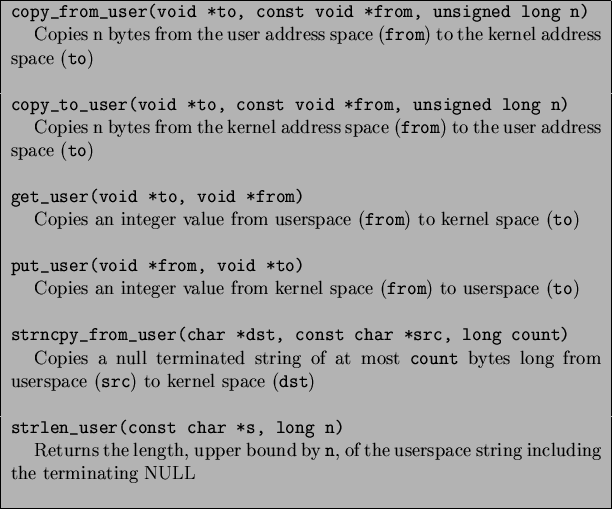 |
It is not safe to access memory in the process address space directly as there is no way to quickly check if the page addressed is resident or not. Linux relies on the MMU to raise exceptions when the address is invalid and have the Page Fault Exception handler catch the exception and fix it up. In the x86 case, assembler is provided by the __copy_user() to trap exceptions where the address is totally useless. The location of the fixup code is found when the function search_exception_table() is called. Linux provides an ample API (mainly macros) for copying data to and from the user address space safely as shown in Table 5.5.
All the macros map on to assembler functions which all follow similar patterns of implementation so for illustration purposes, we'll just trace how copy_from_user() is implemented on the x86.
copy_from_user() calls either __constant_copy_from_user() or __generic_copy_from_user() depending on whether the size of the copy is known at compile time or not. If the size is known at compile time, there are different assembler optimisations to copy data in 1, 2 or 4 byte strides otherwise the distinction between the two copy functions is not important.
The generic copy function eventually calls the function
__copy_user_zeroing() in ![]() asm-i386/uaccess.h
asm-i386/uaccess.h![]() which has three important parts. The first part is the assembler for the
actual copying of size number of bytes from userspace. If any
page is not resident, a page fault will occur and if the address is valid,
it will get swapped in as normal. The second part is ``fixup'' code and the
third part is the __ex_table mapping the instructions from the
first part to the fixup code in the second part.
which has three important parts. The first part is the assembler for the
actual copying of size number of bytes from userspace. If any
page is not resident, a page fault will occur and if the address is valid,
it will get swapped in as normal. The second part is ``fixup'' code and the
third part is the __ex_table mapping the instructions from the
first part to the fixup code in the second part.
These pairings of execution points and fixup routines, as described in Section 5.5, are copied to the kernel exception handle table by the linker. If an invalid address is read, the function do_page_fault() will fall through, call search_exception_table() and find the EIP where the faulty read took place and jump to the fixup code which copies zeros into the remaining kernel space, fixes up registers and returns. In this manner, the kernel can safely access userspace with no expensive checks and letting the MMU hardware handle the exceptions.
All the other functions that access userspace follow a similar pattern.